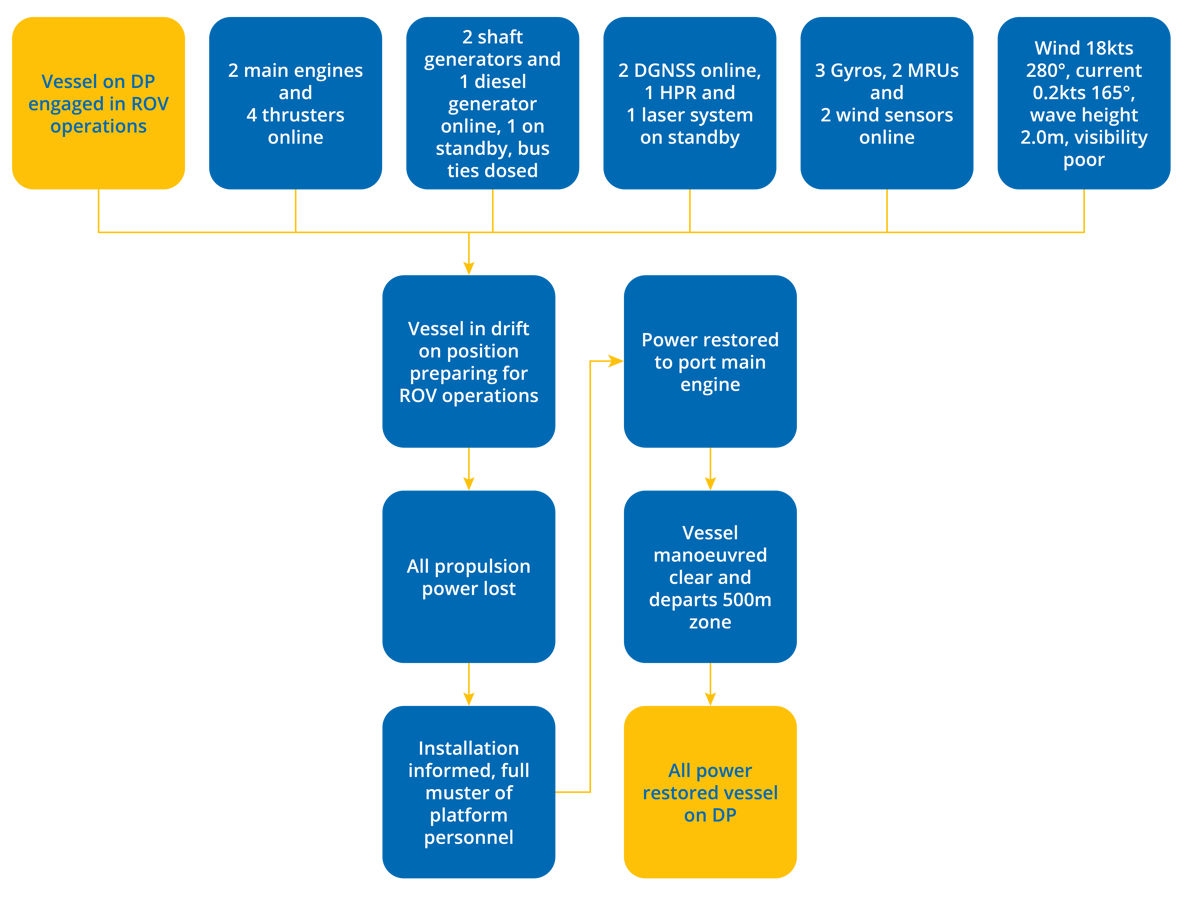Incorrect wiring causes loss of all propulsion
- DP Event
- Published on 13 September 2016
- Generated on 6 July 2025
- DPE 03/16
- 2 minute read
Incident
Jump to:
The main cause of the incident was found to be the improper wiring of the main and backup power supplies.

Comments
Subsequent investigation identified the following:
- Through extensive evaluation by numerous technicians, the main cause of the incident was found to be the improper wiring of the main and backup power supplies. Three engines were electrically connected through the DC40 main power supply. This enabled an erroneous shut down signal to be sent to three engines simultaneously.
- What were the causes of the incident? There was a fault in the wiring configuration of the vessel’s main engine 24VDC supply. The wiring for the main power supply and the backup power supply was reversed which tied the two main engines to the same main power supply, thereby reducing vessel redundancy. Furthermore, a ground fault was identified on the main 24V supply to the main engines. Subsequent testing revealed the diesel control units (DCU) responded differently when subjected to grounding tests; the port main engine would continue running while the starboard main engine would shut down.
- What lessons were learnt? This misconfiguration, and subsequent loss of DP redundancy, was unknown to the crew. The wiring of the vessel’s main engine 24VDC supply had been completed prior to the current management company assuming management of the vessel. This incident further stresses the importance of a maintenance programme and complete maintenance records.
Actions
Several changes were made to the vessel’s systems such as the replacement of the governor, DC40 battery supply and the starboard DCU and all was tested to satisfaction. To ensure the matter has been completely rectified, the vessel was subjected to a full five-year FMEA.
Considerations
This incident stresses the importance for a good initial FMEA, the tracking of modifications and ensuring documentation is up to date, plus the importance of proving redundancy groups on a frequent basis.
Latest DP incidents
-
Complete the job
Whilst connected to a turbine, an alarm was generated on the DP operator station, ‘Unbalanced load on SWBD 1’.
DPE 01/25
16 January 2025
Undesired event
-
How is your alignment?
Loss of the CyScan position reference system generated a reference system failure alarm and moments later the vessel began to lose position with the accompanying alarms.
DPE 01/25
16 January 2025
Incident
-
Beware your centre of rotation
The stern thrusters started to oscillate which transferred to an oscillating motion of the vessel and high forces were being used to try to maintain position.
DPE 01/25
16 January 2025
Incident
-
A-Tension
Whilst pipelaying in shallow water, the vessel experienced a tension sensor failure on one tensioner.
DPE 01/25
16 January 2025
-
DP Drill Scenario
DP emergency drill scenarios are included to assist DP vessel management, DPOs / Engineers, and ETOs in conducting DP drills onboard.
DPE 01/25
16 January 2025
Drill Scenario
The case studies and observations above have been compiled from information received by IMCA. All vessel, client, and operational data has been removed from the narrative to ensure anonymity. Case studies are not intended as guidance on the safe conduct of operations, but rather to assist vessel managers, DP operators, and technical crew.
IMCA makes every effort to ensure both the accuracy and reliability of the information, but it is not liable for any guidance and/or recommendation and/or statement herein contained.
Any queries should be directed to DP team at IMCA. Share your DP incidents with IMCA online. Sign-up to receive DP event bulletins straight to your email.